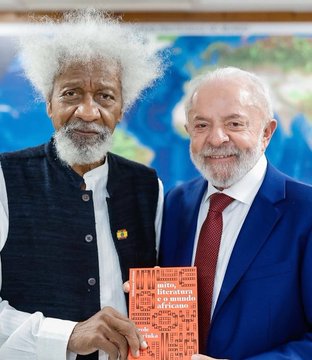
Brazilian President Luiz Inácio da Silva Welcomes Nobel Laureate Wole Soyinka in Landmark Cultural Exchange

In a historic diplomatic and cultural encounter that has drawn the attention of global observers, Brazilian President Luiz Inácio Lula da Silva hosted Nigerian Nobel laureate and literary icon, Professor Wole Soyinka, in Brasília. The meeting between the Brazilian head of state and Africa’s first Nobel Prize winner in literature has been hailed as a powerful symbol of South-South cooperation, cultural diplomacy, and intellectual solidarity between two nations with deep historical ties and a shared commitment to using art, literature, and politics as tools for social transformation.
The presidential palace was abuzz with anticipation as Soyinka, widely regarded as one of the most influential voices in contemporary literature and a fearless defender of human rights, was received by Lula da Silva in a warm ceremony that blended the solemnity of state protocol with the celebratory spirit of cultural exchange. The Brazilian President, himself a figure renowned for his fight against social inequality and his enduring connection with the working-class struggles of Brazil, welcomed Soyinka with glowing words about his contributions to literature, democracy, and global justice. Lula described the Nigerian writer as “a conscience for humanity, a man whose words have shaped the struggle for freedom, and whose pen has stood against tyranny across generations.”
Wole Soyinka, who won the Nobel Prize for Literature in 1986, has long been a towering figure not only in Nigeria but across the world, revered for his plays, poetry, essays, and his relentless activism against authoritarianism. His meeting with Lula da Silva comes at a time when both Brazil and Nigeria are redefining their roles on the global stage, seeking new avenues for cooperation that extend beyond traditional diplomacy into the realms of cultural and intellectual partnerships. In his address, Soyinka expressed admiration for Brazil’s rich cultural landscape and acknowledged the deep historical connections between Brazil and Africa, particularly Nigeria, which has ancestral and cultural links with the Afro-Brazilian community that traces its roots back to the transatlantic slave trade.
Observers have noted that the symbolism of the meeting was as important as the dialogue itself. Both men, though hailing from vastly different professional backgrounds, embody resilience, intellect, and an unwavering belief in the power of people to shape their destinies. Lula, a former metalworker who rose to become the President of Brazil through grassroots political activism, and Soyinka, a writer who spent years in prison for his resistance against military dictatorship in Nigeria, share parallel narratives of courage, defiance, and triumph against oppression. The gathering was not only a meeting of statesmanship and literature but also a convergence of two legacies that have inspired millions across continents.
Diplomatic analysts have suggested that the encounter could pave the way for deeper cultural collaborations between Nigeria and Brazil, two of the largest democracies in the Global South. Discussions reportedly touched on fostering literary exchanges, translation of works between Portuguese and Yoruba, and collaborative educational programs that would link universities in Nigeria with their counterparts in Brazil. Such initiatives would serve to bridge linguistic and cultural divides, giving young people in both nations access to the rich intellectual traditions that Soyinka represents and the progressive political ideals that Lula has championed.
The Brazilian President also emphasized the importance of strengthening ties between Latin America and Africa, recalling that Brazil has the largest population of people of African descent outside of Africa itself. Lula stressed that engagements such as his meeting with Soyinka highlight not only historical responsibility but also the future potential of Afro-Brazilian and African partnerships in literature, education, science, and cultural identity. “The time has come,” Lula declared, “for us to honor our shared history with concrete actions that uplift our people, empower our youth, and allow us to tell our stories to the world with our own voices.”
Soyinka, in his response, underscored the role of literature and culture in shaping political consciousness and fostering global solidarity. He spoke passionately about the need for nations of the Global South to tell their own stories, free from the distortions of colonial narratives and Western-centric frameworks. “Our cultures are not mere ornaments for the world stage,” Soyinka remarked, “they are instruments of liberation, of truth, and of justice. Brazil and Nigeria carry in their histories the scars of oppression but also the fire of resistance. Let us turn that fire into a beacon for a more equitable future.”
The atmosphere of the meeting was also enriched by cultural displays that reflected the Afro-Brazilian heritage, including performances of capoeira and Yoruba-inspired Brazilian music, which served as living reminders of the enduring connection between West Africa and Brazil. Soyinka, who has often celebrated Yoruba cosmology and African traditions in his works, appeared visibly moved by the cultural presentations that tied together the past and present of both regions.
Reactions from both Brazilian and Nigerian communities have been overwhelmingly positive, with many describing the event as a reminder of the power of cultural diplomacy in fostering unity and progress. Nigerian officials have expressed hope that the visit would open doors for stronger bilateral relations in areas such as education, literature, film, and the creative industries. Brazilian commentators have also praised President Lula’s decision to spotlight Soyinka, arguing that such gestures place culture at the center of international dialogue in ways that conventional statecraft often overlooks.
Global leaders and intellectuals have also weighed in on the significance of the meeting, noting that it comes at a time when the world is grappling with issues of inequality, racism, and the struggle for democracy in multiple regions. The symbolism of two elder statesmen—one from the world of politics and the other from literature—standing together in mutual respect and shared vision has been described as a powerful reminder of the enduring relevance of leadership rooted in values and conviction.
As the meeting drew to a close, both men exchanged symbolic gifts, with Lula presenting Soyinka with a commemorative work celebrating Brazil’s multicultural heritage, and Soyinka gifting Lula a signed copy of one of his celebrated plays. The gesture, simple yet profound, encapsulated the spirit of the day: a recognition that literature, culture, and politics, when aligned, can chart new pathways for unity and shared progress.
The historic encounter between Brazilian President Luiz Inácio da Silva and Nobel laureate Wole Soyinka will undoubtedly be remembered as a milestone in the cultural diplomacy of the Global South. It was more than a meeting of a head of state and a literary giant; it was a reminder of the transformative power of ideas, the unifying force of culture, and the enduring strength of human resilience. For Brazil, for Nigeria, and for the world at large, the image of Lula and Soyinka together is an emblem of what is possible when politics and literature converge in the service of humanity.

